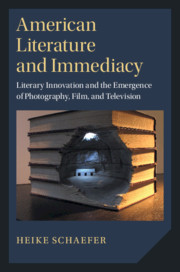 American Literature and Immediacy
American Literature and Immediacy Book contents
- American Literature and Immediacy
- Cambridge Studies in American Literature and Culture
- American Literature and Immediacy
- Copyright page
- Dedication
- Contents
- Acknowledgements
- The Quest for Immediacy in American Literature and Media Culture
- Part I Literary Immediacy and Photography
- Part II Literary Immediacy and the Cinema
- Part III Literary Immediacy and Television
- Chapter 7 Being There: Television’s Aesthetics of Immediacy
- Chapter 8 For Real? The Critique of TV Culture in the Short Fiction of Robert Coover and David Foster Wallace
- Chapter 9 “Nothing Happens Until It Is Consumed”: The Remediation of TV Images in Don DeLillo’s Novel Mao II
- Chapter 10 Fiction in the Age of Television
- Still in Pursuit
- Notes
- Bibliography
- Index
- Series page
Chapter 8 - For Real? The Critique of TV Culture in the Short Fiction of Robert Coover and David Foster Wallace
from Part III - Literary Immediacy and Television
Published online by Cambridge University Press: 19 December 2019
- American Literature and Immediacy
- Cambridge Studies in American Literature and Culture
- American Literature and Immediacy
- Copyright page
- Dedication
- Contents
- Acknowledgements
- The Quest for Immediacy in American Literature and Media Culture
- Part I Literary Immediacy and Photography
- Part II Literary Immediacy and the Cinema
- Part III Literary Immediacy and Television
- Chapter 7 Being There: Television’s Aesthetics of Immediacy
- Chapter 8 For Real? The Critique of TV Culture in the Short Fiction of Robert Coover and David Foster Wallace
- Chapter 9 “Nothing Happens Until It Is Consumed”: The Remediation of TV Images in Don DeLillo’s Novel Mao II
- Chapter 10 Fiction in the Age of Television
- Still in Pursuit
- Notes
- Bibliography
- Index
- Series page
Summary
Discussing works by Robert Coover and David Foster Wallace, this chapter argues that the critical remediation of TV’s aesthetics of immediacy provided an innovative impetus for the experimental postmodernist fiction of the 1960s and 70s and the literary fiction of the 1980s and 90s. Among the first generation of writers to address TV, Coover parodies in his short story “The Babysitter” how TV conflates the fictive and the real by eroding the boundaries between on- and off-screen worlds. The story plays with narrative levels to debunk TV’s logic of spectacle and consumption. Twenty years later, Wallace likewise explores how TV alters our sense of the real. Yet he distances himself from the ironical stance he finds characteristic of both his postmodernist precursors and of TV. In his essay “E Unibus Pluram” and short stories like “Little Expressionless Animals,” he advocates a return to a self-reflexive poetics of sincerity. Although their poetics and historical moment differ, both Coover and Wallace rework televisual immediacy effects to challenge TV’s promise of direct participation and connection and to expand the representational reach and cultural pertinence of literature.
Keywords
- Type
- Chapter
- Information
- American Literature and ImmediacyLiterary Innovation and the Emergence of Photography, Film, and Television, pp. 184 - 210Publisher: Cambridge University PressPrint publication year: 2020
